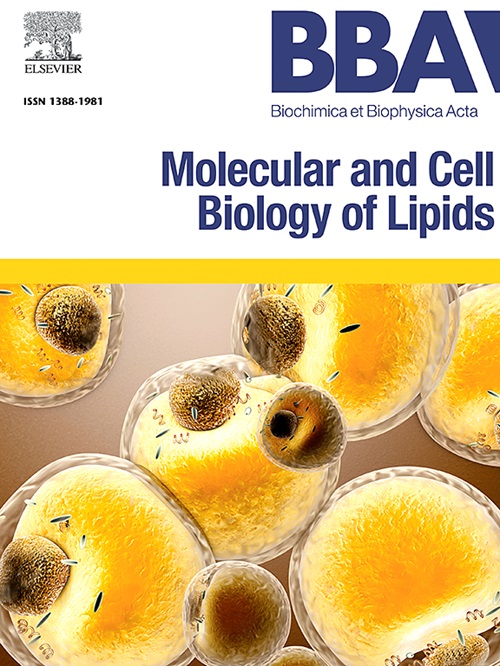Fatty acid binding protein 1 (FABP1) depletion promotes an oxidative metabolic shift in Caco-2 colorectal cancer cells
IF 3.3
2区 生物学
Q2 BIOCHEMISTRY & MOLECULAR BIOLOGY
Biochimica et biophysica acta. Molecular and cell biology of lipids
Pub Date : 2025-07-08
DOI:10.1016/j.bbalip.2025.159661
引用次数: 0
Abstract
Lipid metabolism reprogramming is a well-established hallmark of many cancer types, including colorectal cancer (CRC). Nevertheless, a clear understanding on how fatty acid (FA) metabolism is fine-tuned during CRC development and progression is still missing. Given that CRC is the second leading cause of cancer-related death, addressing these critical aspects may provide the rationale for new therapeutic approaches and early biomarker identification. Fatty acid binding protein 1 (FABP1) is a small protein that binds FA and other lipophilic compounds, acting as a lipid transporter in the intestine. Little is currently known about the function of FABP1 in CRC. Here we show that the knockdown of FABP1 in CRC cells impairs de novo FA and cholesterol synthesis, specifically, via altering the transcriptional regulation of lipid metabolism genes. FABP1 depletion suppresses the expression of FA and cholesterol synthesis-associated genes while promoting that of FA oxidation genes and mitochondrial oxidative pathways. The latter is associated with increased oxygen consumption rate and activation of the energy sensor 5’ AMP-activated kinase (AMPK). Taken together, our results show that FABP1 orchestrates the balance between FA synthesis and oxidation, most likely to prevent the cytotoxic effects of circulating unbound free fatty acids. Thus, targeting FABP1 function may represent a potential therapeutic strategy in advanced CRC.
脂肪酸结合蛋白1 (FABP1)的缺失促进Caco-2结直肠癌细胞的氧化代谢转变。
脂质代谢重编程是许多癌症类型的一个公认的标志,包括结直肠癌(CRC)。然而,在结直肠癌的发生和发展过程中,脂肪酸(FA)代谢是如何微调的,目前还没有明确的认识。鉴于结直肠癌是癌症相关死亡的第二大原因,解决这些关键问题可能为新的治疗方法和早期生物标志物鉴定提供基础。脂肪酸结合蛋白1 (FABP1)是一种结合FA和其他亲脂化合物的小蛋白,在肠道中起脂质转运体的作用。目前对FABP1在CRC中的作用知之甚少。本研究表明,在结直肠癌细胞中,FABP1的敲低会损害FA和胆固醇的新生合成,特别是通过改变脂质代谢基因的转录调节。FABP1缺失抑制FA和胆固醇合成相关基因的表达,同时促进FA氧化基因和线粒体氧化途径的表达。后者与氧气消耗率增加和能量传感器5' amp活化激酶(AMPK)的激活有关。综上所述,我们的研究结果表明,FABP1协调了FA合成和氧化之间的平衡,最有可能阻止循环未结合的游离脂肪酸的细胞毒性作用。因此,靶向FABP1功能可能是晚期结直肠癌的一种潜在治疗策略。
本文章由计算机程序翻译,如有差异,请以英文原文为准。
求助全文
约1分钟内获得全文
求助全文
来源期刊
CiteScore
11.00
自引率
2.10%
发文量
109
审稿时长
53 days
期刊介绍:
BBA Molecular and Cell Biology of Lipids publishes papers on original research dealing with novel aspects of molecular genetics related to the lipidome, the biosynthesis of lipids, the role of lipids in cells and whole organisms, the regulation of lipid metabolism and function, and lipidomics in all organisms. Manuscripts should significantly advance the understanding of the molecular mechanisms underlying biological processes in which lipids are involved. Papers detailing novel methodology must report significant biochemical, molecular, or functional insight in the area of lipids.

 求助内容:
求助内容: 应助结果提醒方式:
应助结果提醒方式:


